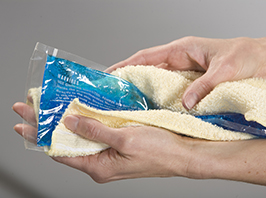Relieving Back Pain
Back pain is a common problem. You can strain back muscles by lifting too much weight or by twisting. Or you can do it by moving the wrong way. Back strain can be painful. And it can take weeks or months to get better. Try these tips to help yourself feel better. They can also help prevent back strains.
It is important to try to remain active. Be sure to avoid strenuous activity. But you can start walking and doing daily activities as soon as possible.
Ice
Ice eases muscle pain and swelling. It helps most during the first 24 to 48 hours after an injury.
-
Wrap an ice pack or a bag of frozen peas in a thin towel. Never put ice directly on your skin.
-
Place the ice where your back hurts the most.
-
Don’t ice for more than 20 minutes at a time.
-
You can use ice several times a day.

Medicines
Over-the-counter pain relievers include acetaminophen and anti-inflammatory medicines. These include aspirin, naproxen, and ibuprofen. They can help ease slight pain. Some also ease swelling.
-
Tell your health care provider about any medicines you are already taking.
-
Take medicines only as directed.
-
Always talk to your child's health care provider before giving your child or teen aspirin.
Manipulation and massage
It may help to have a treatment called spinal manipulation. You can go to an osteopathic health care provider or chiropractor for this treatment. Getting a massage or acupuncture may also help. Or you may want to try physical therapy. A physical therapist can set up an exercise program that works to ease your pain. This can also help prevent further injuries.
Heat
After the first 48 hours, heat can relax sore muscles. And it can improve blood flow.
-
Try a warm bath or shower. Or use a heating pad set on low. To prevent a burn, keep a cloth between you and the heating pad.
-
Don’t use a heating pad for more than 15 minutes at a time. Never sleep on a heating pad. This can cause burns if you have diabetes or other conditions that affect how well you can sense heat.
Online Medical Reviewer:
Esther Adler
Online Medical Reviewer:
Joseph Campellone MD
Online Medical Reviewer:
Rita Sather RN
Date Last Reviewed:
2/1/2025
© 2000-2025 The StayWell Company, LLC. All rights reserved. This information is not intended as a substitute for professional medical care. Always follow your healthcare professional's instructions.